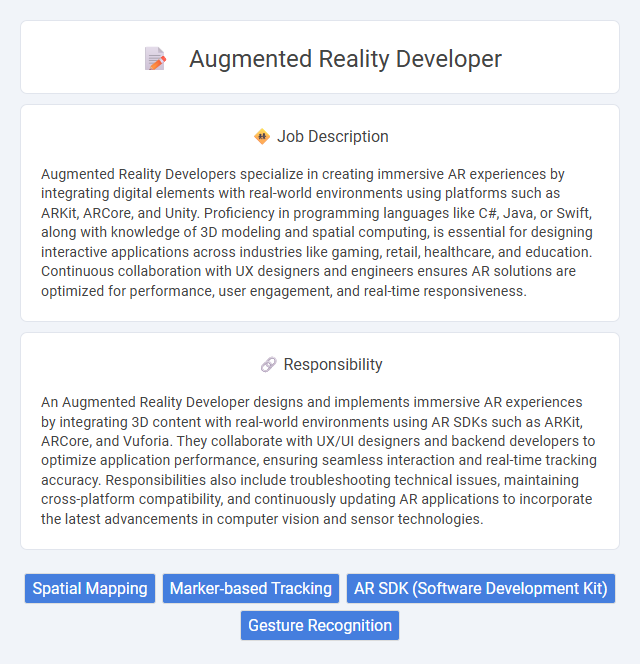
Augmented Reality Developers specialize in creating immersive AR experiences by integrating digital elements with real-world environments using platforms such as ARKit, ARCore, and Unity. Proficiency in programming languages like C#, Java, or Swift, along with knowledge of 3D modeling and spatial computing, is essential for designing interactive applications across industries like gaming, retail, healthcare, and education. Continuous collaboration with UX designers and engineers ensures AR solutions are optimized for performance, user engagement, and real-time responsiveness.
Individuals with strong programming skills and a passion for cutting-edge technology are likely suited for an Augmented Reality Developer role. People who enjoy problem-solving and have experience in 3D modeling or game development may find this job particularly engaging. Candidates who struggle with rapid technological changes or prefer routine tasks might find this role less compatible with their strengths.
Qualification
Proficiency in programming languages such as C#, C++, and Unity is essential for an Augmented Reality Developer. Strong experience with AR development platforms including ARKit, ARCore, and Vuforia enhances the ability to create immersive experiences. Expertise in 3D modeling, computer vision, and real-time rendering techniques is critical for optimizing application performance and user interaction.
Responsibility
An Augmented Reality Developer designs and implements immersive AR experiences by integrating 3D content with real-world environments using AR SDKs such as ARKit, ARCore, and Vuforia. They collaborate with UX/UI designers and backend developers to optimize application performance, ensuring seamless interaction and real-time tracking accuracy. Responsibilities also include troubleshooting technical issues, maintaining cross-platform compatibility, and continuously updating AR applications to incorporate the latest advancements in computer vision and sensor technologies.
Benefit
Augmented Reality Developer roles likely offer significant career growth potential due to the expanding application of AR technology across industries such as gaming, healthcare, and retail. Employees may benefit from hands-on experience with cutting-edge software and hardware, enhancing their technical skill set and marketability. Competitive salaries and opportunities for innovation might also contribute to job satisfaction for professionals in this field.
Challenge
Working as an Augmented Reality Developer likely involves navigating complex challenges related to integrating virtual elements seamlessly into real-world environments. The role probably demands solving technical issues with hardware compatibility and optimizing software for diverse platforms while maintaining high performance. Developers may frequently face evolving AR frameworks and user experience considerations that require continuous adaptation and innovation.
Career Advancement
An Augmented Reality Developer specializes in creating immersive AR applications that blend digital content with the physical world, leveraging expertise in Unity, ARKit, ARCore, and 3D modeling. Career advancement opportunities include roles such as Senior AR Developer, AR Project Manager, or AR Solutions Architect, with potential to transition into AI integration and mixed reality innovation leadership positions. Continuous learning in emerging AR technologies and acquiring skills in user experience design and cloud computing significantly enhance professional growth and salary potential.
Key Terms
Spatial Mapping
Augmented Reality Developers specializing in spatial mapping utilize advanced sensor data and computer vision algorithms to create accurate 3D models of physical environments. These professionals enhance user interaction by enabling real-time object placement and environment understanding within AR applications. Mastery of tools like ARKit, ARCore, and Unity's spatial mapping APIs is essential for delivering immersive and responsive augmented reality experiences.
Marker-based Tracking
Augmented Reality Developer specializing in marker-based tracking designs interactive experiences by detecting and interpreting specific visual markers within the user's environment. Expertise in computer vision algorithms, OpenCV, and AR SDKs such as Vuforia or ARToolKit enables precise overlay of digital content onto physical markers. Skilled in optimizing real-time rendering and tracking accuracy, these developers enhance user engagement across applications in gaming, education, and industrial training.
AR SDK (Software Development Kit)
Augmented Reality Developers specialize in creating immersive experiences by leveraging AR SDKs such as ARKit, ARCore, and Vuforia to build interactive applications across mobile and wearable platforms. Proficiency in integrating computer vision, spatial mapping, and sensor data through these SDKs optimizes real-time tracking and object recognition functionalities. Expertise in Unity or Unreal Engine combined with AR SDKs enables rapid prototyping and deployment of scalable augmented reality solutions for gaming, retail, and industrial use cases.
Gesture Recognition
Augmented Reality Developers specializing in Gesture Recognition design and implement advanced algorithms to interpret user hand and body movements, enhancing intuitive interaction within AR environments. They utilize machine learning models and computer vision techniques to accurately capture and analyze gestures in real-time, improving the immersive experience on devices like AR headsets and smart glasses. Mastery of frameworks such as Unity, OpenCV, and TensorFlow is essential for developing robust gesture-based AR applications.
 kuljobs.com
kuljobs.com